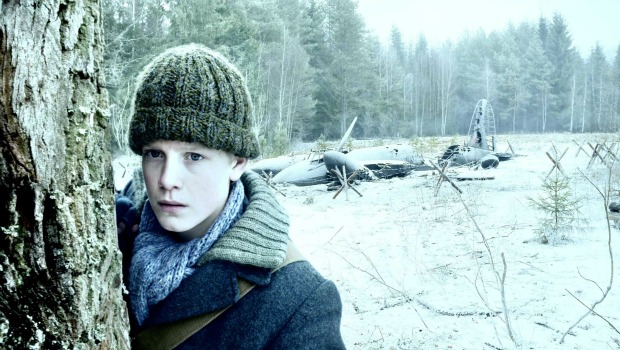Winter in Wartime
14-year-old scallywag Michiel has a natural distrust of his country’s Nazi occupiers and by proxy his father, Johan, who he sees as a collaborator.
Plot summary
Near the end of World War II, 14-year-old Michiel becomes involved with the Resistance after coming to the aid of a wounded British soldier.

This story of a boy in occupied Holland during World War II was hugely successful in the Netherlands, outgrossing Twilight and The Dark Knight. It is Holland’s entry for the foreign language Oscar and is, after some time, getting a UK release.
14-year-old scallywag Michiel has a natural distrust of his country’s Nazi occupiers and by proxy his father, Johan, who he sees as a collaborator. Johan uses his privileged position as the Mayor of a rural town to win small victories for the oppressed locals and, he hopes, ensure the safety of his family in uncertain times. Michiel is enamoured by his uncle Ben, who is a bearded bear of a resistance fighter to Johan’s slight frame and stoic demeanour.
Enter stranded British pilot, Jack, played by Jamie Campbell Bower: Jonny Depp’s mate in Sweeny Todd and one of the camp vamps in New Moon. Michiel takes Jack on as his own Onderduiker – the Dutch name for those hidden from the Nazi state – and enters the war proper.
Winter in Wartime looks good, modern techniques giving the historical period accessibility. Lots of handheld shots give vibrancy and dynamism to action which takes place in a lifeless town and a wintery wood of scantily clad pines. Originality is not abundant in the cinematography, but old tricks are used pretty well and this lets the story do the talking.
The film’s score is all strings and chorus, a bit too much melodrama for the nicely under-acted film. The family relationships and an adolescent love story are low key, but the film steps up nicely to a high pace for some tense action sequences. The winter itself is well captured and in physical moments you are reminded the sensitivity that cold brings, like cold ears snagged in a rugby scrum.
It is based on the novel Oorlogswinter, written by former Dutch deputy Prime Minister Jan Terlouw of the social-democratic minority party D66. The story is part of a tradition in post-war Europe for tough fiction about war, which performs an educational role. The text is standard reading for Dutch schoolchildren, and may remind those bought up in British schools of stories like The Machine Gunners, which tells a similar story of children’s escalating involvement in the war at large.
It seems there is a need for tough war stories about children to give kids an understanding of what their forebears went through. Both of these books were written in the 1970s, when perhaps an older generation worried about the reality of war being forgotten amongst the frivolity of pop culture.
Comparable children’s war stories often play on the child’s naivety (The Boy in the Striped Pyjamas) or simply use war as a background for tales of adolescence (Carrie’s War). In Oorlogswinter, like the best of this kind of story, the growing up is done in the midst of reckless involvement in the war, which gives the story resonance beyond classroom recitation.
Director Martin Koolhoven chose to aim the film at a more mature audience than the book:
“Children [over 12] actually see many films targeted at an adult audience, so they are used to it. To me, that legitimised an adult approach to the story, giving it real complexity.”
He’s right, those in that limbo between the Disney demographic and hardcore horror are often underestimated, the result being Transformers.
This film does a good job of dealing with tricky issues of collaboration and resistance. To what degree is it ones responsibility to fight an invading force, when the risk is so great? Is loyalty to family stronger than to country or ideology?
In the sparse, snowy setting, a blizzard of moral questions fills the air and the conclusion is that maturity is seeing the shades of grey, like those that make up the palette of the film itself.











COMMENTS